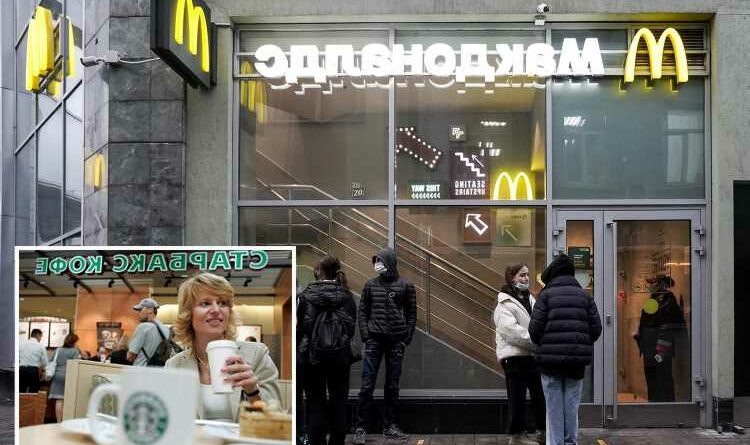My Moscow landlady washed empty McDonald's boxes to proudly display on the mantelpiece – this ban will hit Russians hard
A NEW front opened up in the battle for Ukraine yesterday – the stomachs of the Russian people.
Vladimir Putin and his generals are suddenly facing a fight they can’t control – the closure of hundreds of McDonald’s, KFCs, Pizza Huts and Starbucks across Russia.
This struggle for the hearts, minds and stomachs of the Russian people could be a turning point in how the war is perceived by those who have so far supported Putin’s invasion.
Coca Cola and Pepsi also announced they were suspending all Russian operations.
As The Sun’s Moscow Correspondent in the early ‘90s, I saw first hand just how powerful the Big Mac was in a country whose economy had been crippled by the Cold War.
When McDonald’s first Moscow restaurant opened in Pushkin Square on January 31 1990, almost 40,000 queued for hours for a taste of fries and milkshakes.
Read more on Ukraine
It was like nothing they’d ever tasted.
For millions of Soviet citizens, communism had meant decades of empty shops, bland food, and terrible fashions.
Life was grim, grey, tasteless and remorselessly tough.
Under the Soviet system, most restaurants were almost impossible to access unless you could bribe the stony faced doorman with a packet of Marlboro cigarettes.
Most read in The Sun
NEW HAIR DON'T CARE EastEnders legend Lucy Benjamin is completely different with grey hair
Katie Price reveals her biggest EVER boob job on a boat in Thailand
EastEnders star Jessie Wallace becomes a grandma at 50 as daughter gives birth
People are just discovering why kitchen windows are above the sink
If you got a table, the food was mostly stale and tasteless.
I often spent Saturday afternoons walking around Moscow city centre where the only places to buy food were McDonald’s and a Pizza Hut restaurant a few hundred yards from Red Square.
It seemed unbelievable that in the capital of a so-called superpower, you couldn’t grab a quick snack or a drink anywhere.
A trip to either fast food place was treated as a big day out for Muscovites.
People dressed up in their best clothes and once they got inside McDonald’s would stay for hours sometimes eating two meals as they savoured never-before delights of a Quarter Pounder or Big Mac.
The food tasted the same as in Britain. Truly an international menu.
As she finished a vanilla milkshake she’d taken home to savour in her living room, my landlady Irena explained: “I’ve never tasted such variety. It feels like I have joined the rest of the world.”
The McDonald’s brand was so fashionable, Irena washed out the milkshake cup and placed it on her mantelpiece alongside two empty and carefully washed burger boxes.
For this well educated English teacher these bizarre decorations were her connection to the West.
Today, as McDonald’s starts to temporarily close its 850 restaurants, Putin is facing a potentially disastrous backlash from a population deprived of something as simple as Big Mac and fries and a decent cup of coffee.
Putin’s war is about to starve his people of something precious – tasty food and drink – and not just from McDonald’s
After Starbucks announced it would pull down the shutters on its 100 coffee shops, KFC yesterday announced its 70 Russian restaurants would be temporarily shut and 50 Pizza Huts are also suspending business.
Putin can hide the war by controlling TV news and banning coverage of protests, but he can’t hide the closure of hundreds of much-loved fast food restaurants and coffee shops across his country.
He also knows that as soon as news of these closures spreads, it will spark fury from millions who have been fooled into supporting his mad war.
'Putin can't hide'
Generations of older Russians who currently believe his war propaganda will be appalled at the prospect of going back to a time they remember when finding something to eat or drink at a fast food restaurant was an impossible dream.
Any positives ordinary Russians think might come from conquering Ukraine could be wiped out by the simple fact of them not being able to enjoy a Big Mac or a frothy Starbucks coffee.
In Kyiv, Ukranian officials know how vital this war on Russian fast food could be.
Before the suspensions were announced, Ukraine’s foreign minister, Dmytro Kuleba, said: “We were upset to hear companies like Coca-Cola and McDonald’s remain in Russia and continue providing their products.”
Despite this plea, McDonald’s was slow to act but announced its suspension following intense social media pressure including a powerful plea on Twitter from former BBC Panorama reporter John Sweeney – now freelancing in Kyiv – for a McDonald’s boycott unless it stopped trading in Russia.
Announcing McDonald’s Russian suspension, chief executive Chris Kempczinski, said all its 62,000 Russian staff would continue to be paid.
He added: “We understand the impact this will have on our Russian colleagues and partners.
“The conflict in Ukraine and the humanitarian crisis in Europe has caused unspeakable suffering to innocent people. As a system, we join the world in condemning aggression and violence and praying for peace.”
The fast food companies’ temporary exit comes as the overall Russian economy slipped further into chaos yesterday as sanctions continued to wreck the country's finances.
The credit rating agency Fitch downgraded the country’s junk status from B to C which means it believes Russia will not be able to repay the Kremlin’s debt.
McDonald’s arrival helped transform Russia in 1990 helping it emerge from the misery of life under communism.
The fear of its departure after 32 years could start turning the tide against Putin as ordinary Russians feel the effects of the Ukrainian invasion via their stomachs.
Read More on The Sun
In Kyiv and Western capitals, officials will be hoping we might soon start to witness a real-life fast food revolution.
Graham Dudman was The Sun’s Moscow Correspondent in 1990. He is now deputy managing editor at News Associates, part of Beat Media Group.
Source: Read Full Article















